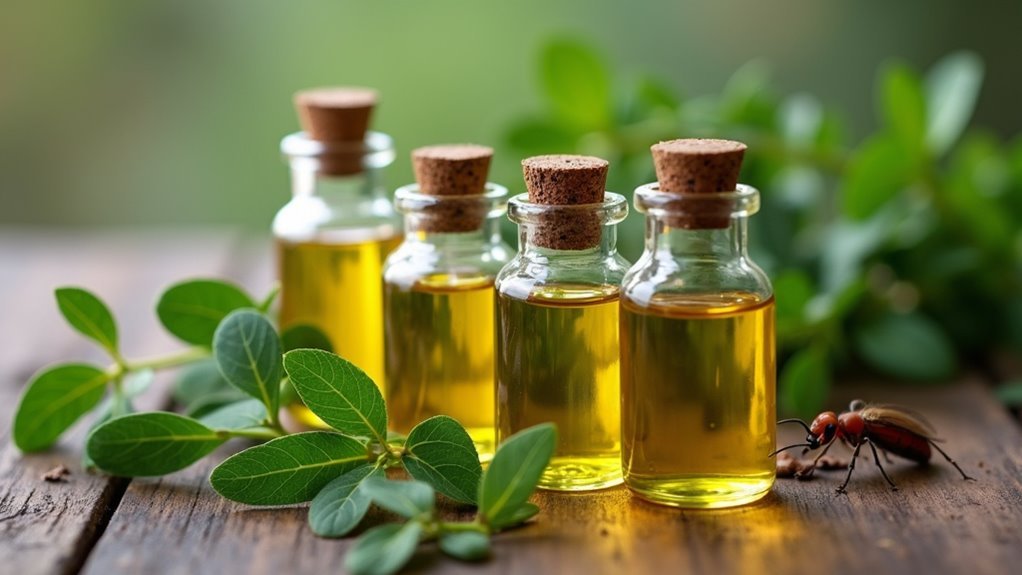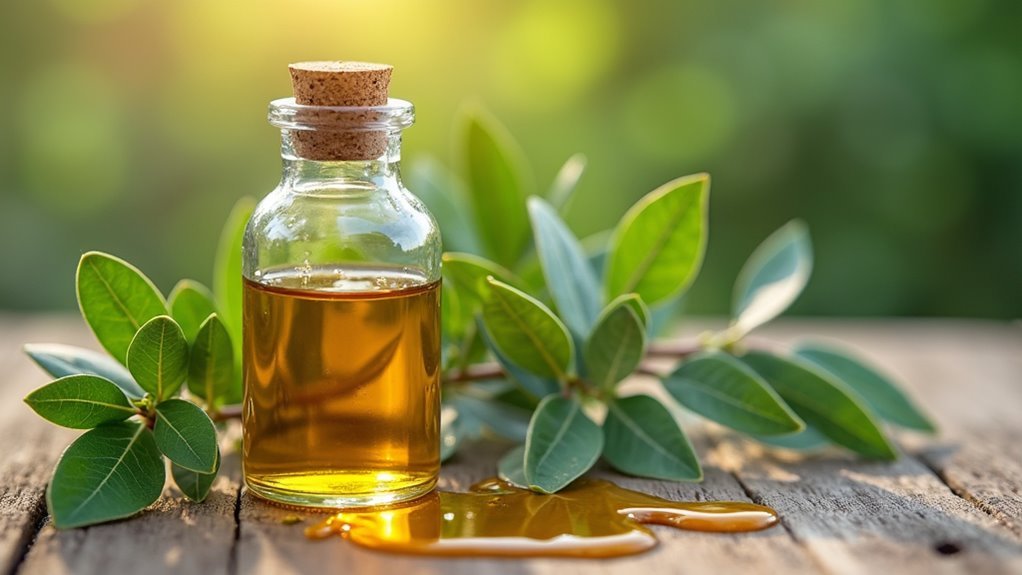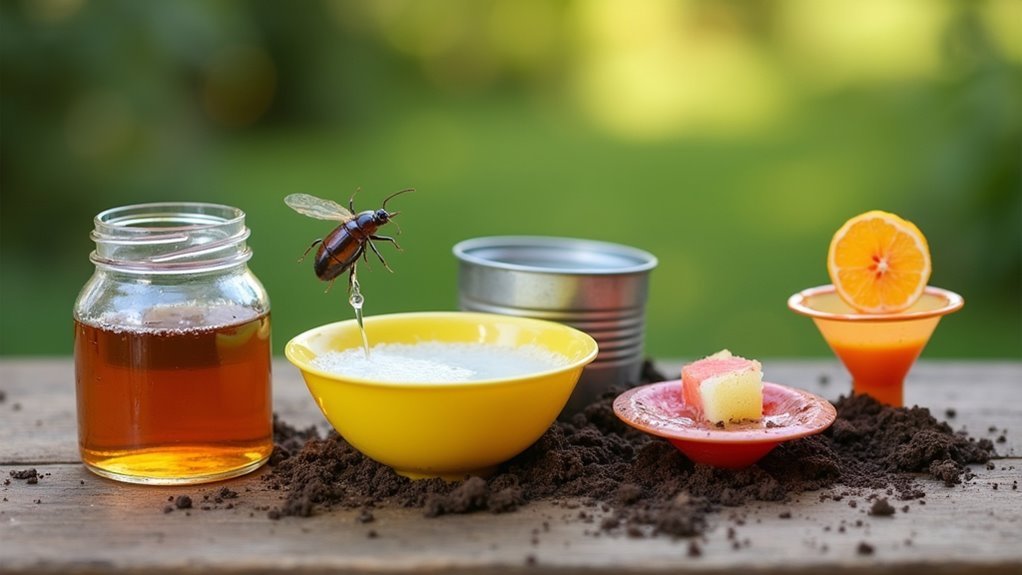You can effectively repel termites using several powerful plant oils that disrupt their communication and create toxic barriers. Clove oil’s high eugenol content acts as a potent fumigant, while wintergreen oil achieves up to 100% mortality rates in treated wood. Tea tree, cedarwood, neem, citronella, and orange oils also provide excellent protection by overwhelming termites’ sensory systems and disrupting their reproductive cycles. Proper application techniques and concentration levels will maximize your natural termite defense strategy.
How Plant Oils Repel Termites

Several plant oils work as powerful termite deterrents by disrupting the insects’ natural behaviors and biological processes. When you apply these natural solutions, they interfere with termites’ ability to communicate through pheromone trails, making it difficult for them to navigate and establish colonies.
Plant oils also create toxic environments that can kill termites on contact or within hours of exposure. These oils don’t just mask scents – they actively repel termites by overwhelming their sensory systems.
You’ll find that oils like garlic extract can eliminate termites within 24 hours, while others like catnip oil greatly reduce tunneling activity. For effective termite control, these botanical solutions target multiple aspects of termite biology, from communication disruption to direct toxicity, providing you with natural protection.
Clove Oil for Termite Control
You’ll find clove oil stands out as one of the most potent natural termite repellents due to its high eugenol content, which termites can’t tolerate.
You can apply it directly to infested wood or use it preventively around vulnerable areas where termites might enter your property.
You’ll get the best results when you understand proper application techniques and combine clove oil with other natural pest control methods for maximum effectiveness.
Clove Oil Properties
When you’re searching for a powerful natural termite deterrent, clove oil stands out as one of the most effective plant-based solutions available.
Derived from Syzygium aromaticum flower buds, this potent oil contains eugenol, the compound responsible for its remarkable anti-termite properties. You’ll find that clove oil works as a fumigant, using its strong aroma to repel and eliminate termites on contact.
What makes this termite repellent particularly valuable is its ability to disrupt feeding behavior, preventing colonies from establishing themselves in your property.
Unlike harsh chemicals used by traditional natural pest control services, you can safely apply clove oil around your home without toxic concerns.
When you use concentrated applications, you’ll see significant reductions in termite populations, making it a practical and eco-friendly pest management solution.
Application Methods Effectiveness
Although clove oil’s anti-termite properties are well-established, its effectiveness depends heavily on how you apply it. This natural insect repellent requires proper dilution and strategic placement to maximize results against termite infestations.
| Application Method | Dilution Ratio | Effectiveness Level |
|---|---|---|
| Direct spray | 1:10 (oil:water) | High contact kill |
| Carrier oil mix | 1:5 (clove:carrier) | Extended coverage |
| Soil treatment | 1:15 (oil:water) | Preventive barrier |
| Wood treatment | 1:8 (oil:carrier) | Long-term protection |
| Perimeter spray | 1:12 (oil:water) | Area deterrent |
You’ll achieve best results by applying clove oil directly to suspected termite entry points and wooden structures. Among termite repellents, clove oil’s eugenol content guarantees immediate contact killing while its intense aroma creates lasting deterrent effects in treated areas.
Tea Tree Oil as a Natural Deterrent

Tea tree oil stands out as one of nature’s most potent weapons against termites, thanks to its powerful antiseptic and insect-repelling properties that make these destructive pests think twice before invading your space.
This natural termite deterrent works through its active compound terpinen-4-ol, which disrupts termite behavior and can prove lethal upon exposure.
You’ll find tea tree oil particularly effective for termite control because:
- It creates a barrier that termites actively avoid due to its strong scent
- The oil can enhance other pest control methods when used in combination
- You can dilute it with water for safe, non-toxic application around your home
- It provides dual benefits with its pleasant aroma for humans while repelling termites
Simply spray diluted tea tree oil in vulnerable areas for ongoing natural termite protection.
Cedarwood Oil Properties Against Termites
Cedarwood oil brings powerful allelochemicals to your termite defense arsenal, delivering natural compounds that wood-destroying insects instinctively avoid.
You’ll find this aromatic oil creates an unwelcoming environment that termites simply won’t tolerate, making it highly effective for termite control applications.
What sets cedarwood oil apart from other natural repellents is its ability to disrupt termite reproductive cycles, potentially preventing new colony formation in your property.
You can use it safely indoors and outdoors without worrying about toxic chemical exposure to your family or pets.
For maximum effectiveness, combine cedarwood oil with other plant-based deterrents.
This strategic approach enhances your overall defense system against infestations while maintaining an eco-friendly pest management solution.
Wintergreen Oil Effectiveness Studies

Scientific research validates wintergreen oil’s remarkable effectiveness against termites, with UC Riverside entomologists discovering that this methyl salicylate-rich essential oil achieves mortality rates between 92%-100% in treated wood blocks.
You’ll find wintergreen oil surpasses traditional treatments considerably, as untreated wood blocks showed only 36%-44% termite mortality rates.
This termite control method offers several advantages:
- Enhances heat treatment effectiveness in hard-to-reach areas
- Eliminates harmful gas emissions unlike chemical fumigants
- Provides natural alternative alongside conventional pest control
- Delivers consistent results with minimal environmental impact
The Journal of Economic Entomology study demonstrates how incorporating essential oils into your pest management strategy can reduce fumigant dependency.
You’re getting a proven solution that kills termites quickly while maintaining safety standards for your family and environment.
Neem Oil for Termite Prevention
While wintergreen oil excels at killing existing termites, neem oil takes a different approach by disrupting their entire life cycle before infestations can establish. You’ll find neem oil’s azadirachtin compound prevents termites from maturing and reproducing, making it exceptionally effective for long-term termite prevention.
| Property | Benefit | Application |
|---|---|---|
| Azadirachtin compound | Disrupts growth cycles | Direct wood treatment |
| Penetrating ability | Creates protective barriers | Infested area application |
| Eco-friendly formula | Safe for families/pets | Regular preventive use |
When you apply neem oil to wooden structures, it penetrates deep into the material to repel termites from feeding. Research confirms this natural treatment considerably reduces termite activity while providing an environmentally safe alternative to harsh chemicals that you’d typically use for pest management.
Citronella Oil Repellent Qualities
How does citronella oil’s distinctive fragrance become such a powerful termite deterrent? This natural extract from lemongrass creates an effective barrier that termites recognize as a warning signal, causing them to actively avoid treated areas.
Cornell University research confirms citronella oil’s effectiveness against subterranean termites in laboratory conditions. The oil functions as a reliable termite repellent through its potent scent compounds that trigger avoidance behaviors in these destructive pests.
You can maximize citronella’s protective benefits by:
- Applying citronella oil sprays around foundation perimeters and entry points
- Using diffusers to maintain consistent coverage in vulnerable indoor areas
- Planting live lemongrass in garden beds for natural, ongoing protection
- Creating treatment barriers in crawl spaces and basements where termites typically enter
This dual approach combines immediate protection with long-term prevention strategies.
Orange Oil Termite Treatment Benefits
Beyond repelling termites like citronella oil, orange oil takes a more aggressive approach by actually eliminating these pests on contact.
This natural termite treatment contains d-limonene, which disrupts termites’ exoskeletons and respiratory systems, achieving up to 100% mortality rates when properly applied.
You’ll appreciate that orange oil offers an environmentally friendly alternative to harsh chemical pesticides while remaining non-toxic to your family.
Unlike whole-house fumigation, you can apply this termite treatment to localized areas, targeting specific termite infestation spots without vacating your home.
The pleasant citrus scent makes it more user-friendly than conventional treatments, giving you an effective pest control solution that doesn’t compromise your indoor air quality or comfort.
Peppermint Oil Application Methods
You can apply peppermint oil using two main methods that’ll create effective barriers against termites.
The direct spray method involves mixing 10-15 drops of peppermint oil with water in a spray bottle, then applying it to vulnerable areas around your home’s foundation and wooden structures.
Alternatively, you can create soaked cotton barriers by saturating cotton balls with concentrated peppermint oil and placing them strategically near potential entry points.
Direct Spray Application
Direct spray application transforms peppermint oil into an immediate line of defense against termite invasions.
You’ll create an effective termite repellent by mixing 10-15 drops of peppermint oil with water in a spray bottle. This natural deterrent method gives you precise control over treatment areas.
Apply your peppermint oil solution directly to suspected termite locations:
- Spray around wooden structures and baseboards where termites typically enter
- Target cracks and crevices in foundations and walls
- Treat outdoor wooden surfaces like decks and fencing
- Focus on moisture-prone areas where termites congregate
Remember that regular reapplication every few weeks maintains effectiveness since the oil’s potency diminishes over time.
The pleasant aroma enhances your home’s environment while protecting against unwanted termite activity.
Soaked Cotton Barriers
When precise placement matters more than broad coverage, soaked cotton barriers offer a targeted approach to termite deterrence.
You’ll create these barriers by soaking cotton balls in concentrated peppermint oil solution, then placing them strategically where termite activity’s suspected. The strong peppermint scent disrupts termite navigation and makes colony establishment difficult in treated areas.
Research shows peppermint oil contains compounds that interfere with termite pheromone communication, boosting its effectiveness.
These soaked cotton barriers repel termites naturally without toxic chemicals, making them eco-friendly additions to your pest control strategy.
You’ll need to replace the cotton regularly to maintain potent scent levels.
This targeted method works especially well in corners, cracks, and entry points where broad spraying isn’t practical or desired.
Eucalyptus Oil Termite Barrier Protection
Although chemical termite treatments dominate the pest control market, eucalyptus oil offers a compelling natural alternative that’s proven effective against these destructive insects.
This essential oil contains powerful compounds that naturally repel termites, creating an effective termite barrier around your wooden structures.
Eucalyptus oil’s strong scent disrupts termite communication and navigation systems, making it an excellent protective solution. You can apply it directly to wood surfaces for immediate protection.
- Direct wood treatment: Apply eucalyptus oil directly onto wooden surfaces to create a protective coating
- Communication disruption: The strong scent interferes with termite pheromone trails and navigation
- Historical effectiveness: Traditional pest control methods have long relied on eucalyptus oil’s repelling properties
- Regular maintenance required: Reapply frequently due to the oil’s quick environmental degradation
Essential Oil Concentration Levels for Maximum Effect
Five critical concentration thresholds determine whether your essential oil treatment will successfully eliminate termites or merely provide temporary deterrence.
Methyl salicylate achieves 92%-100% termite mortality at effective concentration levels, making it one of the most potent options.
Methyl salicylate demonstrates exceptional potency against termites, delivering near-complete elimination rates when applied at proper therapeutic concentrations.
You’ll need high concentrations of catnip oil for lethal effects, though it’s less effective than commercial termiticides.
Concentrated garlic solutions kill termites within 24 hours, demonstrating rapid action at proper strength.
Nootkatone concentration proves essential for vetiver grass effectiveness against termites.
While termite-repelling plants like lemongrass naturally contain active compounds, concentrated oil extracts often require higher application rates.
You must balance concentration levels carefully – too low provides minimal protection, while excessive amounts waste resources without proportional benefits.
Proper Application Techniques for Plant Oils
You’ll need to master the right dilution ratios when mixing plant oils with carrier substances to create effective termite repellent solutions.
Your choice of application tools and methods will determine how evenly you distribute the oils across wooden surfaces and soil areas.
The timing and frequency of your treatments are essential since environmental factors can reduce the oils’ effectiveness over time.
Dilution and Mixing Ratios
Getting the concentration right makes all the difference when preparing plant oil solutions for termite control. Proper dilution guarantees you’re creating an effective termite repellent while protecting your plants and surrounding environment from potential damage.
Here are key mixing ratios for different plant oils:
- Wintergreen oil: Mix 1:10 with carrier oil for safe, effective application
- Garlic extract: Steep 10 crushed cloves in 2 cups distilled water for 24 hours
- Lemongrass oil: Combine 1:4 with water for direct spraying on susceptible areas
- Catnip oil: Dilute 1:5 with carrier oil or water to maximize effectiveness
For mint oil applications, you’ll want 2 tablespoons per quart of water.
These ratios help you harness each oil’s natural properties without overwhelming the treatment area.
Application Methods and Tools
While having the right dilution ratios is essential, applying plant oils correctly guarantees they’ll work effectively against termites.
Use a spray bottle for even distribution of your diluted mixture on wooden structures, foundation soil, and entry points. For direct termite control, apply concentrated plant oils with a sponge or cloth to wood surfaces where infestations occur.
Time your application methods during cooler parts of the day to prevent rapid evaporation and maximize efficiency. Hot temperatures reduce the oils’ potency quickly.
Reapply your plant oils every few weeks or immediately after heavy rainfall to maintain protective barriers. Regular treatments guarantee continuous termite deterrence.
Focus on thorough coverage in high-risk areas for peak results.
Frequency and Timing
Effective plant oil termite control depends heavily on when and how often you apply these natural deterrents. Timing and frequency of applications directly impact your success in preventing infestations.
Apply plant oils during cooler periods—early morning or late afternoon—to minimize evaporation and maximize absorption. Environmental factors constantly reduce their potency, requiring strategic reapplication schedules.
- Standard application: Every two weeks under normal conditions
- Peak season intensification: Weekly applications during spring and summer when termite activity increases
- Post-weather reapplication: After heavy rainfall or irrigation that washes oils away
- Temperature consideration: Cool periods prevent rapid evaporation and improve effectiveness
Regular inspection guarantees you’re maintaining adequate protection levels. During peak termite seasons, increased frequency creates stronger barriers against potential infestations, making your plant oil termite control strategy more reliable and effective.
Combining Multiple Plant Oils for Enhanced Results
Although individual plant oils can effectively repel termites, combining multiple oils creates a more powerful defense system against these destructive pests.
When you blend plant oils like wintergreen and garlic extract, you’ll achieve remarkable results—studies show up to 100% termite mortality in treated wood blocks.
You can maximize repellent properties by mixing oils such as lemongrass and clove, creating natural deterrents that outperform single oils.
The synergistic effects of combining catnip and vetiver grass provide broader spectrum protection against different termite species.
You’ll find that mixed plant oils target various life stages and behaviors, creating potent barriers that confuse termites and reduce infestation likelihood in treated areas.
Frequently Asked Questions
What Essential Oil Keeps Termites Away?
You can use wintergreen oil with methyl salicylate for killing termites, lemongrass oil with citronella for repelling them, or catnip oil to inhibit their tunneling. Garlic extract also works effectively within twenty-four hours.
What Plant Repels Termites?
You’ll find vetiver grass most effective for repelling termites since it contains nootkatone and creates deep roots that deter subterranean species while preventing erosion in your garden areas.
What Oil Do Termites Hate?
You’ll find termites hate garlic oil most, as it’s deadly within 24 hours. Clove oil’s spicy aroma also repels them effectively, while wintergreen oil achieves complete elimination when combined with heat treatment.
Does Lavender Oil Kill Termites?
Lavender oil doesn’t kill termites, but it’ll repel them effectively. You can use it to deter infestations by disrupting their communication pheromones. It’s better as prevention than elimination once termites establish colonies.
In Summary
You’ve learned how plant oils like clove, tea tree, cedarwood, wintergreen, and eucalyptus effectively repel termites through natural compounds. You’ll get best results when you use proper concentrations and apply them correctly to vulnerable areas. Don’t hesitate to combine multiple oils for enhanced protection. You’re now equipped with eco-friendly alternatives to chemical treatments that’ll protect your property while keeping your family and environment safe from harmful pesticides.





Leave a Reply